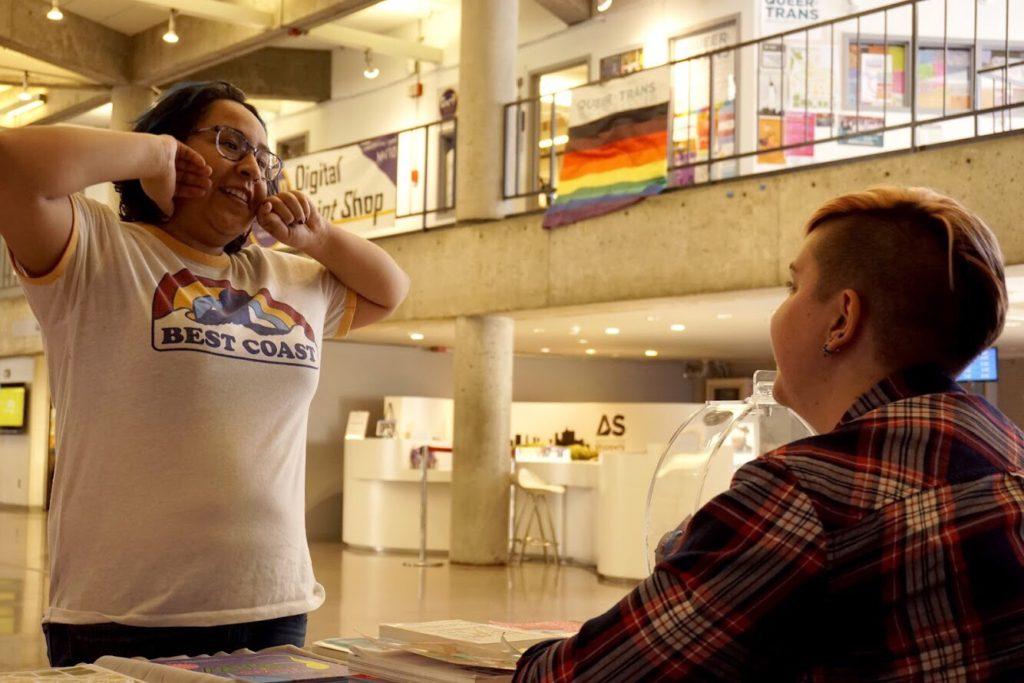The spirit of the first-ever recorded act of collective queer resistance to social oppression and police harassment in the U.S. occurred took place in the Tenderloin District in August 1966 and was embodied at the campus sponsored event for International Transgender Day of Visibility (ITDOV).
“It’s nice to see that other people care about trans people. I only see stuff for gay people in general. It’s nice to see something that’s just for us,” said Mitch Sokolovsky, art major and transgender student.
ITDOV is an annual event and a day for people to support the transgender community, celebrate their feats, raise awareness for the community and combat transphobia around the globe according to the National Center for Transgender Equality: 2018.
The event held on March 28 at the Cesar Chavez Student Center was sponsored by various campus organizations including: Education & Referral Organization for Sexuality (EROS), Richard Oakes Multicultural Center, Queer Alliance, and the Division of Equity and Community Inclusion.
Traditionally restrooms are gender specific: men or women. On campus, there are designated gender-neutral inclusive restrooms across campus.
In an effort to be gender inclusive and increase visibility for the transgender community, three restrooms in Cesar Chavez Student Center were made into gender neutral restrooms during the event. Typically, there is only one available in the building.
While Tanya Mannion, engineering major and transgender student, thought it was a nice gesture toward the transgender community, not everyone felt that the SF State is doing enough to accommodate its transgender students.
“SF State does not support transgender students when it comes to accessibility to all gender bathrooms. Currently in this building there is only one all-gender bathroom which is next to the cis-male bathroom which is also very problematic,” said Quinn Solis, assistant for the Queer & Trans Resource Center (QTRC), and transgender student in the masters education program.
Solis states that the restroom is not accessible as it does not lock from the inside. As a result, on the few occasions that they have used the bathroom, people have walked in on them.
Last year, California passed a state law that makes single-stall bathrooms open to all genders, yet not all on campus are labeled as gender neutral which can be confusing for students like Solis. The current gender neutral bathrooms on campus are also located on one level in the buildings, making them harder to access.
“Although we were able to get all gender bathrooms for this specific event, it’s not enough. Trans folks have health issues because they don’t feel safe going into bathrooms,” said Solis. They would rather not go to the restroom than have to pick a gender. So SF State really needs to step up their game.”
Rick Nizzardini, Interim director of the Health Promotion & Wellness unit, agreed there is room for improvement. We could do better but we have expanded. There’s more that we could do for students to have more access,” he said.
According to Laura Obrist, case manager for the Guardian Scholars Program under the Education Opportunity Program, the event sponsors are working together on a larger effort to permanently improve the availability and accessibility of all gender bathrooms across campus.
“In terms of progressiveness, there is always room for improvement. There is never enough,” said Myha Castro, assistant for the Women’s Center. This sentiment was mutual among the organizations present.
“I hope that it’s an eye opener and the people see that everyone is unique and different and that is a wonderful thing,” Alexis Larson, staff member for the Safe Zone Ally Program.
Larson emphasized that as an ally, it is important to her that transgender individuals feel supported so that transgender people can feel heard.
“This made my day. Just being in this building and seeing this, I have never felt more safe here. This makes me feel really good,” said Mannion.
Nizzardini hopes the event highlighted that there are folx on campus that work for the LGBTQ community and that it helped those who attended.
“I want people to know that programs like this are important because it makes people happy,” said Mannion.
Correction: April 1, 2018 Golden Gate Xpress corrected the pronouns in this article.







